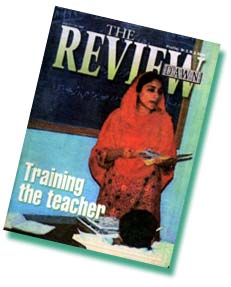
Search the Republic of Rumi |
|
DAWN The Review, August 12-18, 1999
When we speak about education, most of the time we are using words that can only be interpreted in terms of achieving and acquiring. “Getting grades…”, “Stingy or generous teacher…”, “Finishing the syllabus…”, and so on. These words and phrases that are so over-used in our language can only be understood if we think in terms of the “achievement paradigm”. In fact our entire education system is based on this paradigm. The achievement paradigm supposes that education is much like a possession: just as you purchase a car from a showroom or food from a restaurant, you can also “get” education from an educational institution. And the only way to calculate how much you have “got” is by looking at your exam results. If you haven’t obtained excellent marks, it is like having insufficient money; you are poor (it is ironic that the same word is used to describe a person who hasn’t got any money and a student who does not achieve high results). In the achievement paradigm there is no possibility for perceiving education as a process that the student must follow through. There is no emphasis on learning which could permanently change behaviour patterns. As long as students are working with concepts like “getting”, “finishing” and “securing”, to express their perception of education, they are not likely to reflect that education is learning. They are not likely to realize that the purpose of going to a school or a university is to better themselves through personal development. Our education system conditions us to look at exam grades as the end of an education. It conditions us to think and behave as if the school is a supermarket and grades are the goods on display. We can purchase them if we pay the price. The teacher reserves all rights to determine the price of the results, including the right to change the price without prior notice. Different teachers set different prices, and one of the first things the students need to do is to inquire about those set prices. Some teachers accept intelligence as valid currency, others rote learning; and almost all of them give special discounts for flattery (they call it “good behaviour” and “discipline”). Our homes and our society reinforce this image by informing us from the inception that we need the goods displayed in that huge supermarket called the school. Verbally or non-verbally, we are told that we’ll “starve” if we do not obtain those goods from the store. Our parents coupled with the rest of society are prying about our results. It will be an interesting exercise to ask a student to list all the material goods she or he needs in life. The list will probably start with bread and go on to include items meant for decorating a room. Then if you were to ask about the purpose of each item (we have good aesthetics and so on), you will be amazed to notice that many of these needs remind of exam results. If we don’t have bread to eat, then we’re deprived of nutrition. If we don’t have clothes, then we’ll be ashamed in front of our cousins. If we don’t have the essential furniture, the chair and bed, then we can neither relax in the company of our friends nor can we sleep with comfort when we are alone. There is another paradigm called the ”being” paradigm which does not equate learning with material gains. It equates learning with life. The “being” paradigm implies that education does not give you anything. It makes you something. The lessons given in a classroom are not “things” you mist collect now and produce duly on the day of the exam - and throw away later on. The lessons given in a classroom are an experiment conducted on yourself, and if the experiment is successful then you will turn into a learned and wise person. When one is assessed by the teacher, one is not given marks but shown a reflection of what one is - not to make you feel proud or poor, but to tell you how much you still need to experiment on yourself in order to become what you wanted to be (not to get what you wanted to have). The achievement paradigm persists because our schools have lost clarity about the basic aim of education. We are so obsessed with methods, skills and techniques (mostly learnt during our own schooldays) that we rarely stop to think why we are using these skills and methods. What we actually believe is that if each one of us keeps working towards improving our students’ grades then somehow, without our knowing, the students will also turn into worthier human beings. In the process we rarely check our tools. We rarely bother to look at the compass to check if our flight is progressing in the right direction. We rarely pause to ask ourselves whether what we are doing in our classrooms will help our students become better people. The root of all improvement is to ask questions about all we do in the classroom: “It might help my pupils pass the exam. Will it help them live a life?" | We are so obsessed with methods, skills and techniques (mostly learnt during our own schooldays) that we rarely stop to think why we are using these skills and methods. |
|||
 Education is Learning About Personal Development
Education is Learning About Personal Development